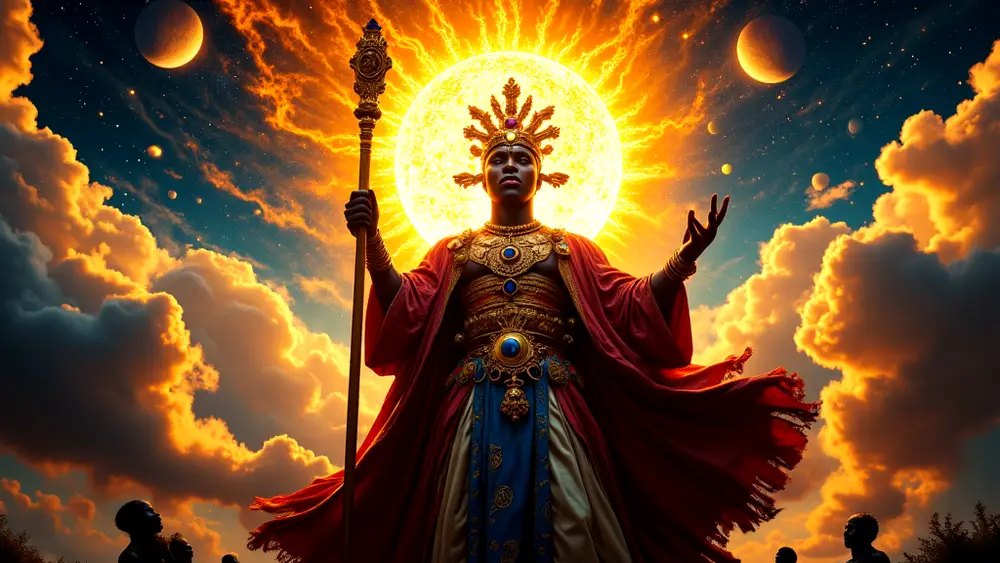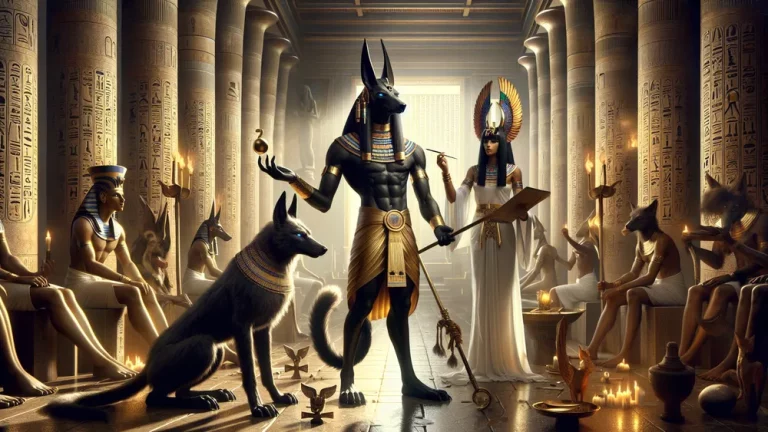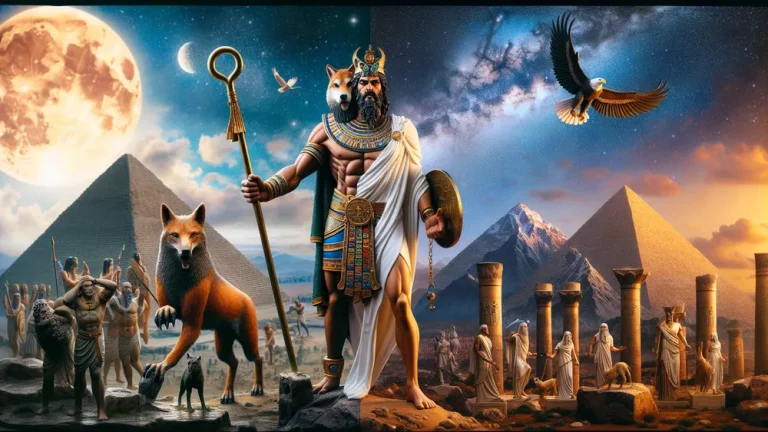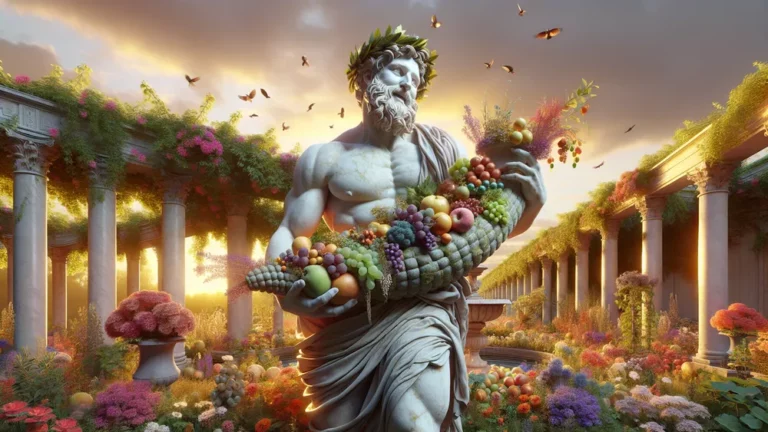Chukwu: The Supreme God In Igbo Mythology And Beliefs
In Igbo mythology, Chukwu is the supreme creator, the force behind the cosmos and its order. Unlike lesser deities, who control specific domains like thunder or fertility, Chukwu’s power is absolute. It influences everything, from human destiny (Chi) to the success of harvests. However, Igbo oral traditions vary by region.
Some describe Chukwu as a distant sky-god, while others emphasize his role in daily prayers. This post will examine these differences, explaining how Chukwu’s myths shape Igbo identity, the significance of yam sacrifices, and how his authority compares to gods like the Yoruba’s Olodumare. Let’s explore these stories together.
Chukwu: Overview and Key Facts
| Attribute | Details | Notes |
|---|---|---|
| Primary Name | Chukwu (also Chineke, “Chi-Ukwu”) | Chineke means “Chi who creates,” though usage varies by clan. |
| Role | Supreme creator god; controls the structure of the universe, human destiny (Chi), and moral laws. Lesser deities, such as Amadioha (thunder), handle specific duties under his authority. | Chukwu holds the highest power, while lesser deities oversee specific functions. |
| Symbols | – Sun: Represents his presence everywhere. <br> – Python (Eke): A sacred messenger. <br> – Ofo staff: Stands for truth and justice. | The python is sacred, and its worship follows strict guidelines, which will be detailed later. |
| Power Scope | All-powerful (controls life and death), all-knowing (aware of all fates), but usually remote. People communicate with him through intermediaries like ancestors. | Unlike Greek gods, Chukwu rarely acts directly in human affairs. |
| Creation Myth | Sent Ala (earth goddess) or Amadioha to shape the world; humans emerged from clay. Alternative version: Some stories say Chukwu created everything without assistance. | These stories will be explored further later. |
| Modern Worship | Includes kolanut offerings, yam festivals (Iri Ji), and prayers through ancestors. Some communities blend these traditions with Christianity. | Traditional worship continues, especially in rural areas. |
Where Chukwu Comes From and What He Does
To know Chukwu fully, we need to understand his beginnings. This includes examining his role as creator as well as his connection to humans.
Chukwu as the Maker of Everything
In Igbo beliefs, Chukwu’s role as creator is central and powerful. Most traditions say he formed the universe from nothing. Some versions say he worked alone. Others mention divine helpers like Ala (earth goddess) or Amadioha (thunder god) assisting with shaping the physical world. Humans were typically made from clay or soil, with Chukwu giving them life. Similar creation ideas appear in many African myths.
These stories differ across regions, showing the variety in Igbo storytelling traditions.
Chukwu has several sacred names, each showing different parts of his divine nature:
- Chineke: “Chi who creates” – focuses on his creative power
- Chi-Ukwu: “Great Chi” – shows his supreme status
- Ezechitoke: “King who creates and owns all” – emphasizes his rule
- Osebuluwa: “The one who carries and sustains the world” – highlights his sustaining role
People use these names in prayers and rituals. Each one has a specific purpose. When an Igbo elder calls on Chineke, they’re asking for creative power, often during births or planting. The different names let worshippers connect with particular aspects of Chukwu depending on their needs. This naming tradition demonstrates how one supreme being can have many divine qualities.
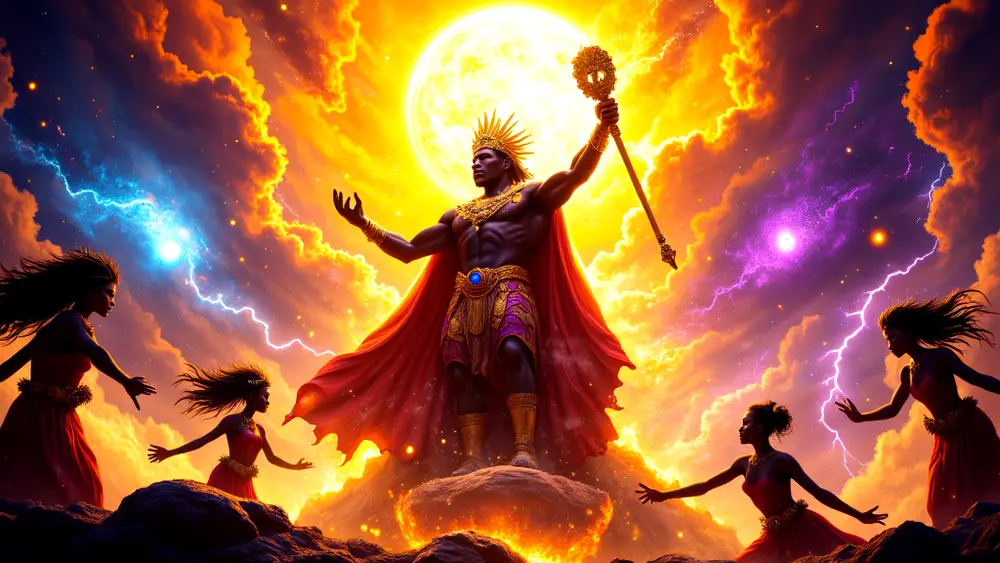
What Makes Chukwu Powerful
Chukwu’s ultimate authority in Igbo beliefs has important similarities with other African supreme gods. This shows shared religious ideas across Africa. Chukwu has three main divine qualities. These include complete power, all-knowing wisdom, and kind generosity. Similar gods like the Yoruba’s Olodumare and Akan’s Nyame share these traits. Yet Chukwu stands out because of his special connection to the Igbo concept of Chi.
This personal divine spark links each person directly to the supreme being.
Here’s how Chukwu compares to other African supreme gods:
| Attribute | Chukwu (Igbo) | Olodumare (Yoruba) | Nyame (Akan) |
|---|---|---|---|
| Power | Creates everything; uses lesser gods | Remote creator; works through Orishas | Sky father; works through abosom |
| Knowledge | Knows all fates (via Chi) | All-seeing through Orunmila | Knows all through divine wisdom |
| Generosity | Provides through land/yams | Blesses through destiny | Gives through nature’s order |
| Connection | Through Chi and ancestors | Through Ifá divination | Through priestly go-betweens |
While all three gods have supreme authority, they connect with people differently. Chukwu’s power works through the personal Chi, making his influence both universal and individual.
Chukwu and the Idea of Chi
In Igbo belief, your Chi represents more than personal fate. It is a distinct spiritual identity that links you to Chukwu. It serves as both your life’s plan and a direct connection to the divine. Your Chi acts as a guardian while also reflecting Chukwu’s will. This explains Igbo traditions. People say “Chi m” with deep respect, just like “Chukwu“.
They recognize this personal bond with the creator. Chukwu relates to Chi through a clear spiritual structure. He sets your general life path through your Chi, but you keep free will in following it. The proverb “Onye kwe, Chi ya ekwe” shows this relationship. It means “When one agrees, their Chi agrees”.
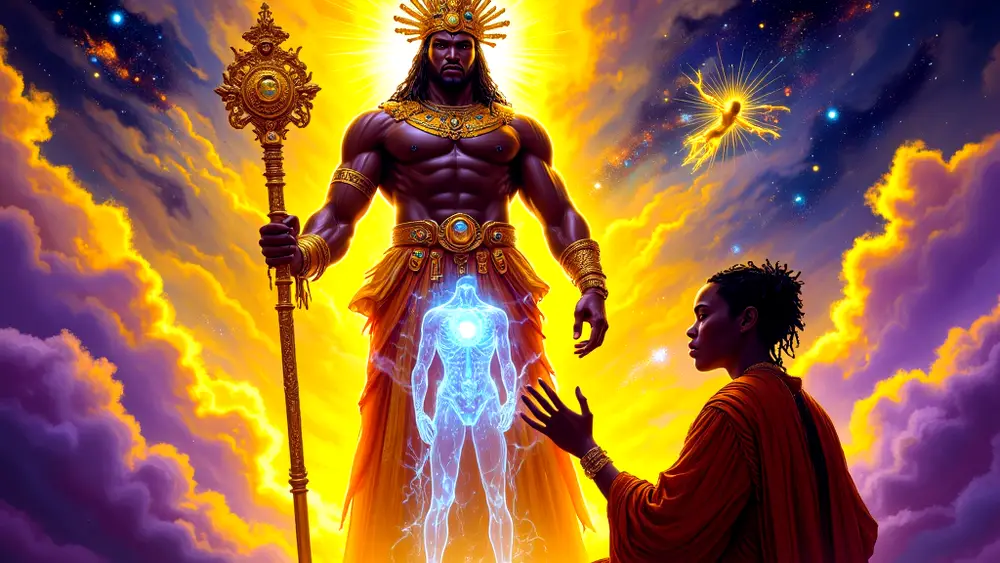
Some traditions say your Chi is chosen before birth, when Chukwu decides your fate. Whereas other traditions see it as more flexible, changing with your decisions. These differences show how the core belief adapts across Igbo communities while keeping the central idea of divine-human connection.
Stories and Legends About Chukwu
Deep ideas about Chukwu appear in Igbo storytelling traditions. These stories have been shared for many generations. Here are key legends that help Igbo people understand their supreme being.
How Chukwu Made the Earth and People
In the beginning, Chukwu existed alone, containing everything that would be created. First, he planned the world carefully. Only then did he begin creating it. Many traditions say he spoke the cosmos into existence. His words became rivers, mountains, and forests of the Igbo homeland. This first act shows Chukwu as the source of all things. Although Chukwu had the power to make everything himself, most stories say he used divine helpers.
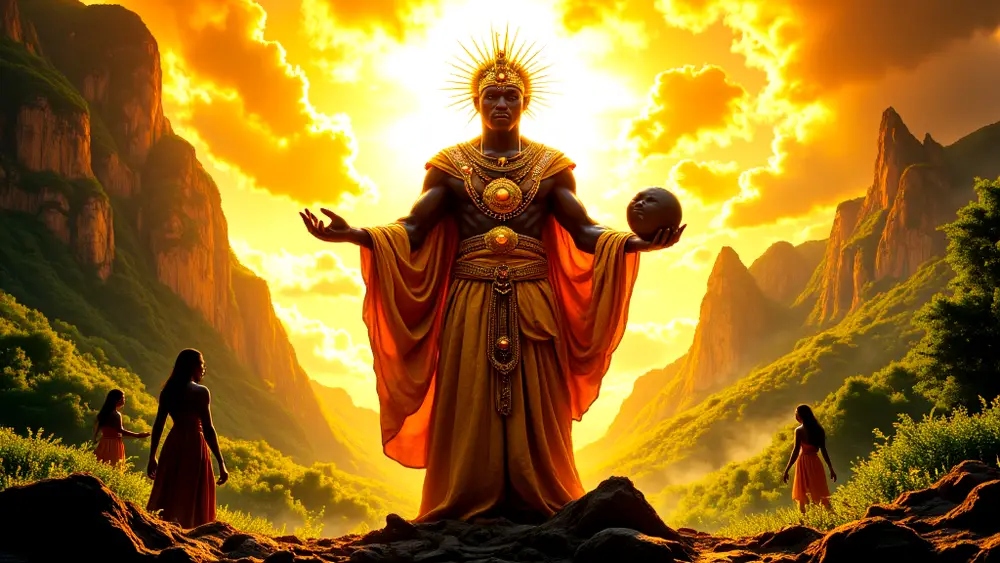
Some traditions credit Ala, the earth goddess, with shaping the land. Different versions say Amadioha, the thunder deity, carved valleys with his storms. These differences probably come from various clan traditions. Each group remembers the creation story slightly differently. What all agree on is that these spirits worked under Chukwu’s command. Human creation holds special meaning in these accounts. Most agree Chukwu formed the first people from clay himself.
The process resembled careful craftsmanship. He shaped each feature before giving them life. Some traditions add that he assigned each person their Chi at this moment. This connected human destiny directly to creation. The detailed work shows the important relationship between Chukwu and humanity in Igbo belief.
Chukwu and the First Offering
In Igbo belief, yams aren’t just food – they’re sacred. They represent the connection between people and Chukwu. This importance comes from the first yam harvest. Early humans offered it to Chukwu, starting a lasting agreement of thanks and exchange. The original story says the first people knew Chukwu gave them their food. They chose their best yams and presented them with prayers.
Certain accounts say this happened on a holy hilltop. Others say it was in an ancient village square. When the yams were roasted, Chukwu accepted them. In return, he promised to keep the land and people fertile. That event set the pattern for offerings. They became spiritual messages, not just required ceremonies.
Modern practices that continue this tradition include:
- Iri Ji Ohuru (New Yam Festival): Yearly thanksgiving where people offer the first yams
- Igo Ofo: Ceremonies led by priests with special yams at family shrines
- Ina Mmanya: Pouring yam drinks to honor Chukwu and ancestors
- Itu Nzu: Cleansing rites using chalk from yam mortars
- Iwa Oji: Kolanut rituals done with yam gifts during important talks
All these keep the original purpose. They recognize Chukwu as the giver of all things while asking for his continued blessings. The exact ways differ by area, but the main idea stays the same throughout Igbo traditions.
The Tale of Why Chukwu Left Earth
At first, Chukwu lived very near to people. Some stories say humans could almost see where he lived. This closeness allowed direct communication. But this closeness also caused problems. Different Igbo groups tell slightly varied stories about why Chukwu left. All agree it changed things completely. The most common version involves an old woman.
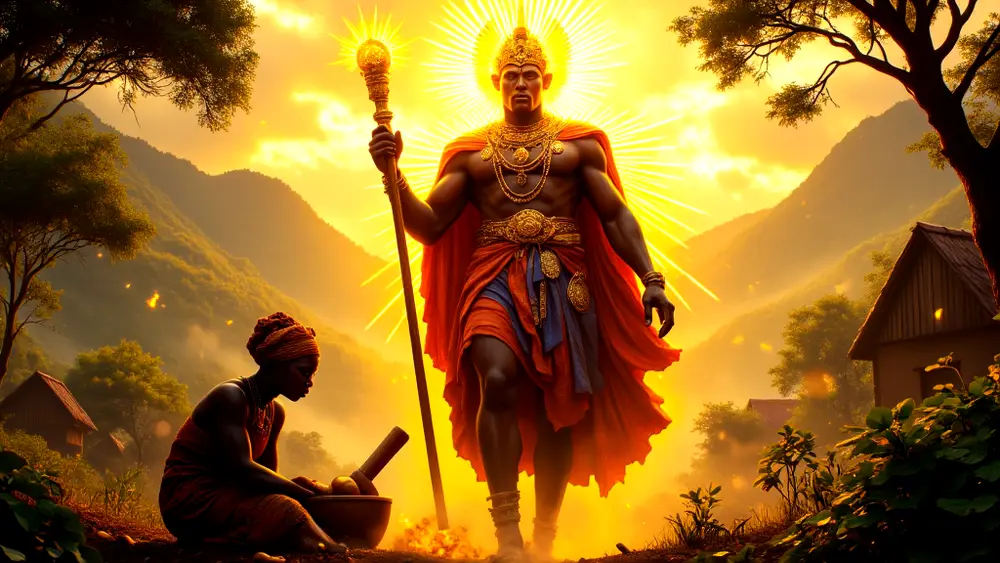
While pounding yams, she kept hitting Chukwu’s resting place with her pestle. Certain versions say this happened at dawn when Chukwu was sleeping. Others focus on how disrespectful the act was. After repeated offenses, Chukwu started moving away step by step. First he went to the treetops, then mountain tops, finally beyond the sky. This departure didn’t mean Chukwu left completely. It set needed boundaries. Now lesser spirits serve as go-betweens.
Ala represents Chukwu on earth, while Amadioha sends messages through thunderstorms. The distance gives humans independence while keeping a sacred connection. This story explains why Igbo people pray through messengers instead of directly to Chukwu. It shows how the divine and human worlds relate to each other.
Signs of Chukwu and How People Honor Him
Although Chukwu now lives in the sky, the Igbo keep important spiritual ties. They use physical signs and longstanding traditions. Here’s how believers honor Chukwu every day and during important rituals.
Sacred Signs Linked to Chukwu
In Igbo spirituality, Chukwu shows himself through special signs. These serve as reminders of his power and ways to worship. Different communities see them slightly differently, but certain signs always connect to Chukwu across Igboland.
The most important sacred signs include:
- The Sun (Anyanwụ): It shows Chukwu’s all-knowing nature and power to give life
- Python (Eke): A holy creature representing wisdom and connection to earth (Ala), often protected in villages
- Ofo Staff: A ceremonial branch standing for divine authority, used in important rituals
- White Chalk (Nzu): Means purity and Chukwu’s presence, used to mark sacred areas
- Kolanut (Ọjị): An offering showing communion between humans and Chukwu, usually given first in ceremonies
These signs contain multiple meanings built up over generations. Elders teach the specific interpretations to younger members. The sun’s daily path shows Chukwu’s constant watch, but also reflects life’s natural cycles. Similarly, when the python sheds its skin, it represents transformation guided by Chukwu.
Rituals and Gifts for Chukwu
The Igbo people keep an active relationship with Chukwu through specific ceremonies. These practices combine thanks, respect, and community unity. Different communities perform them differently, but three main rituals exist throughout Igboland. Each has developed deep meaning over hundreds of years. Chief among these is the New Yam Festival (Iri Ji Ohuru).
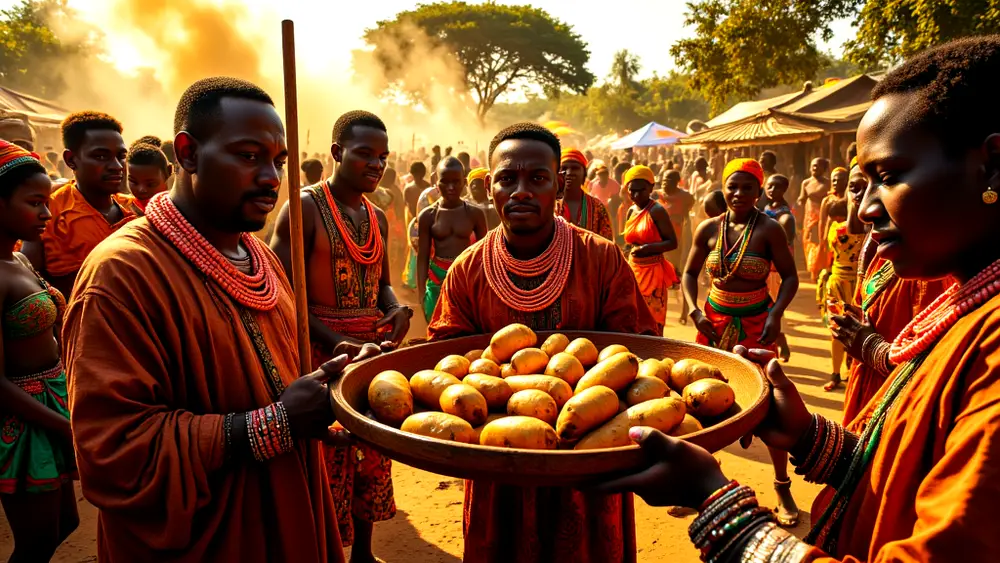
Communities offer their first harvest to Chukwu with dances, music, and feasts. Kolanut invocations (Igo Oji) start most important events, where breaking and sharing kola nuts asks for Chukwu’s blessing. Ancestral prayers (Ikpe Ekpe) use poured offerings and chants, since ancestors communicate with Chukwu. In cities, people modify these traditions while keeping their sacred purpose, demonstrating how Igbo worship adapts.
The Pantheon of African Gods
Chukwu is the highest god in Igbo belief, but African religions include many different gods from various cultures. These divine figures come from traditions across the continent. If you want to learn more about these gods, see this complete list of all the African Gods. It covers major spiritual beings from Akan to Zulu traditions.
FAQs
1. Is Chukwu the same as the Christian God?
While Chukwu and the Christian God share attributes like omnipotence and creation, they originate from distinct theological and cultural traditions.
2. How is Chukwu different from other Igbo deities like Amadioha?
How Chukwu is different from deities like Amadioha lies in his supreme role as the all-powerful creator, while Amadioha serves as a specialized deity of thunder and justice under Chukwu’s authority.
3. Are there still active worshippers of Chukwu today?
Active worshippers of Chukwu today exist primarily among traditional Igbo practitioners and syncretic Christian communities.
4. What is the significance of yams in Chukwu’s worship?
The significance of yams in Chukwu’s worship lies in their role as the first sacred offering, symbolizing gratitude, sustenance, and divine-human communion.

